Managing Psoriasis Flare-Ups: Tips for Seniors
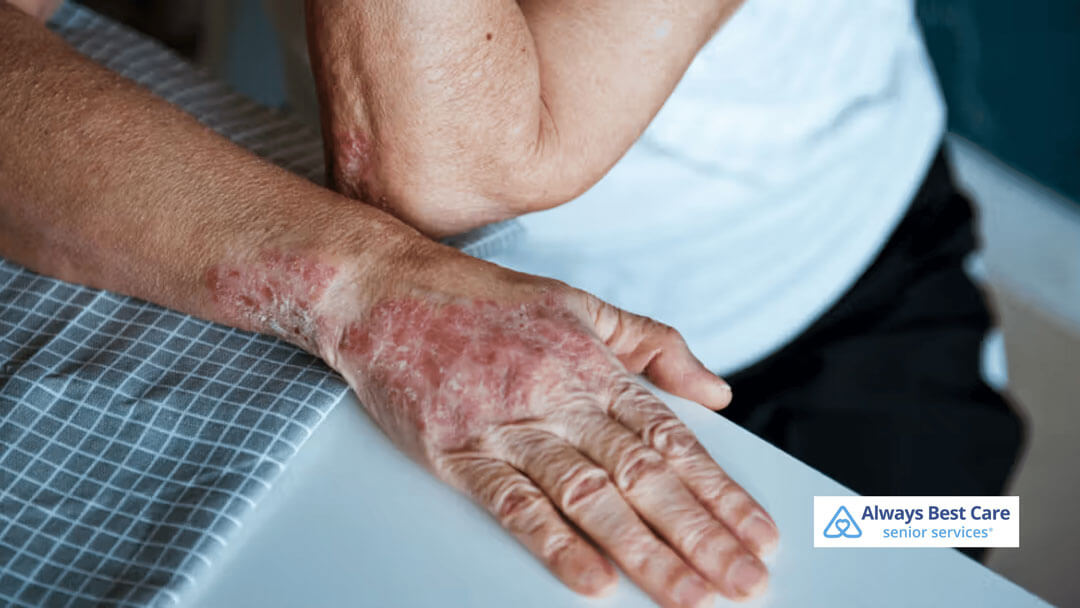
Psoriasis, a common autoimmune disorder, affects millions, including many seniors. As we age, managing this condition can become more challenging due to changes in skin health and overall lifestyle. Flare-ups can cause discomfort and emotional strain, but with the right strategies, seniors can effectively manage their symptoms and maintain a good quality of life. This guide provides practical advice tailored for seniors to navigate and minimize psoriasis flare-ups, ensuring better skin health and overall well-being.
Understanding Psoriasis
Psoriasis speeds up the lifecycle of skin cells, leading to a build-up that forms scales and red patches. These patches can be itchy and painful, making daily life uncomfortable.
Symptoms and Triggers
Psoriasis can present in various ways and is often influenced by specific triggers. Understanding the common symptoms and what can provoke a flare-up is crucial in managing the condition effectively. Here, we delve into the primary symptoms and the typical triggers that can exacerbate psoriasis.
Common Symptoms
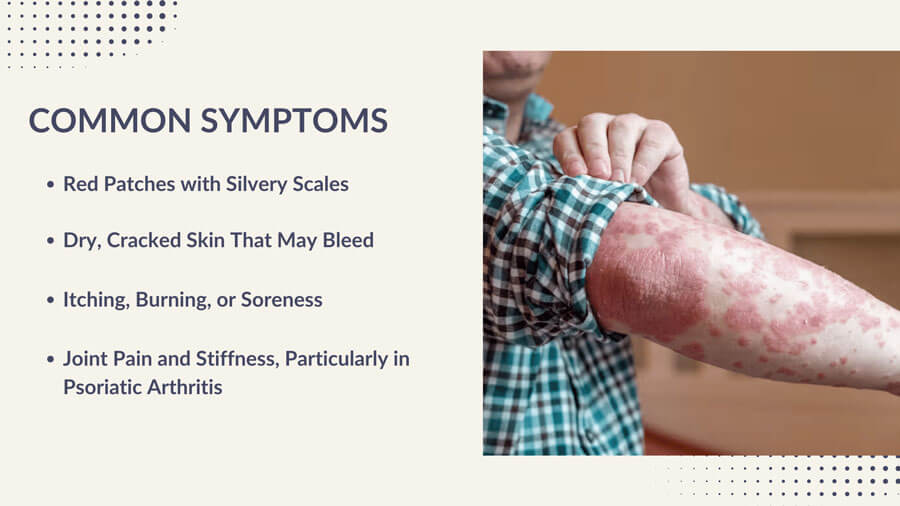
Red Patches with Silvery Scales
One of the most noticeable symptoms of psoriasis is the appearance of red patches covered with silvery scales. These patches can occur anywhere on the body but are most commonly found on the elbows, knees, scalp, and lower back. The severity and size of these patches can vary from a few spots to major eruptions covering large areas.
Dry, Cracked Skin That May Bleed
The rapid turnover of skin cells leads to dry, cracked skin. This dryness can be so severe that the skin may split and bleed, leading to discomfort and a higher risk of infection. Keeping the skin moisturized is essential to managing this symptom.
Itching, Burning, or Soreness
Psoriasis often causes intense itching and a burning sensation. The discomfort can interfere with daily activities and sleep, leading to fatigue and irritability. It’s crucial to avoid scratching as it can worsen the condition and cause further damage to the skin.
Joint Pain and Stiffness, Particularly in Psoriatic Arthritis
Around 30% of people with psoriasis also develop psoriatic arthritis, which causes joint pain, stiffness, and swelling. This can lead to significant discomfort and difficulty in movement, affecting the overall quality of life. Early diagnosis and treatment are vital to managing symptoms and preventing joint damage.
Common Triggers
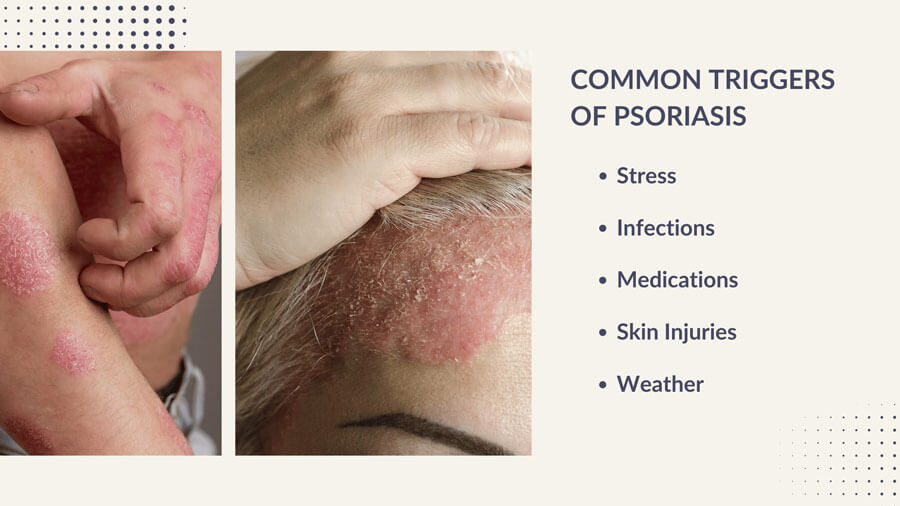
Knowing and avoiding triggers can significantly help in managing psoriasis flare-ups. Here are some of the most common triggers and how they affect the condition:
Stress
Stress is a major trigger for psoriasis flare-ups. Emotional or physical stress can weaken the immune system, making it easier for symptoms to appear. Managing stress through relaxation techniques such as meditation, deep breathing exercises, yoga, or journaling can help keep psoriasis under control.
Infections
Infections like strep throat can trigger psoriasis, especially in children and young adults. Infections put stress on the immune system, which can lead to flare-ups. Practicing good hygiene, avoiding contact with sick individuals, and treating infections promptly can reduce the risk of flare-ups.
Medications
Certain medications can trigger or worsen psoriasis symptoms. Drugs like lithium, antimalarials, and beta-blockers are known to provoke flare-ups. It’s important to inform your healthcare provider about your psoriasis when they prescribe new medications so they can consider alternatives if necessary.
Skin Injuries
Injuries to the skin, such as cuts, scrapes, or severe sunburn, can cause a psoriasis outbreak. This reaction, known as the Koebner phenomenon, can be triggered by even minor injuries. Taking precautions to protect your skin from injury and using sunscreen can help prevent flare-ups.
Weather Conditions
Cold, dry weather can worsen psoriasis symptoms, leading to dry and cracked skin. Conversely, hot and humid weather can cause sweating, which may irritate the skin. Using a humidifier in dry conditions, staying hydrated, and protecting your skin from extreme temperatures can help manage symptoms.
Lifestyle Factors
Certain lifestyle choices can also impact psoriasis. Smoking and excessive alcohol consumption are known to worsen symptoms. Adopting a healthier lifestyle by quitting smoking, reducing alcohol intake, and maintaining a balanced diet rich in anti-inflammatory foods can support skin health and reduce the frequency of flare-ups.
Proactive Strategies to Avoid Triggers
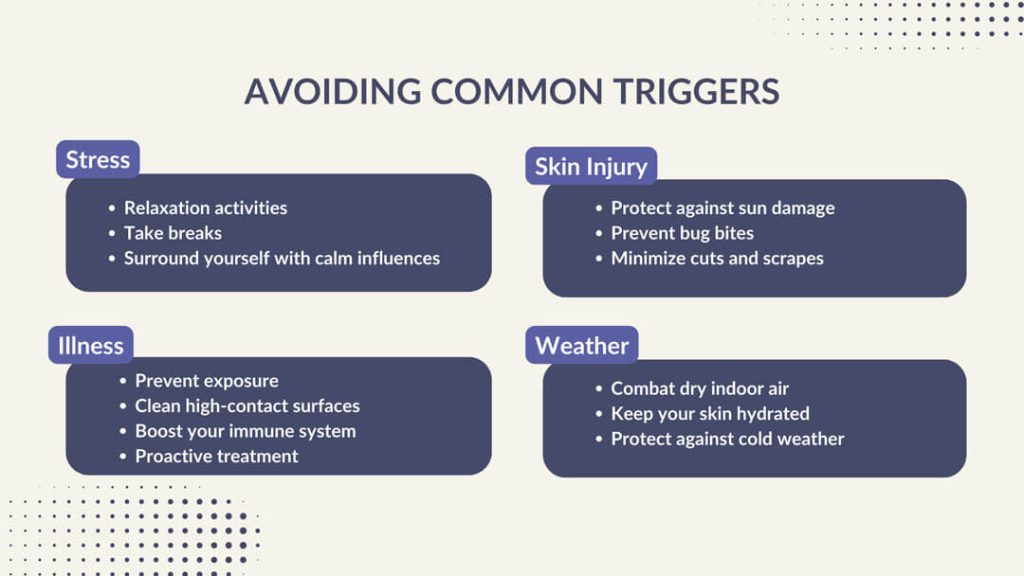
Identifying and avoiding common triggers is crucial. Here are some simple strategies:
Managing Stress
- Relaxation activities: Try meditation, deep breathing, yoga, or journaling.
- Take breaks: When feeling stressed, pause and do something relaxing.
- Calm influences: Spend time with people who promote a calm environment.
Preventing Illness
- Avoid exposure: Stay away from sick individuals and wash hands frequently.
- Clean surfaces: Regularly disinfect commonly touched surfaces.
- Boost immunity: Eat immune-boosting foods and address illnesses promptly.
Protecting Your Skin
- Sun protection: Use sunscreen and wear protective clothing outdoors.
- Avoid injuries: Be careful to prevent cuts and scrapes.
- Prevent bug bites: Use bug repellent and natural deterrents like citronella.
Adapting to Weather
- Combat dry air: Use a humidifier to add moisture to indoor air.
- Hydrate skin: Regularly apply lotion to keep skin moisturized.
- Cold weather protection: Wear warm clothing and layer up when it’s cold.
Managing Psoriasis Flare-Ups
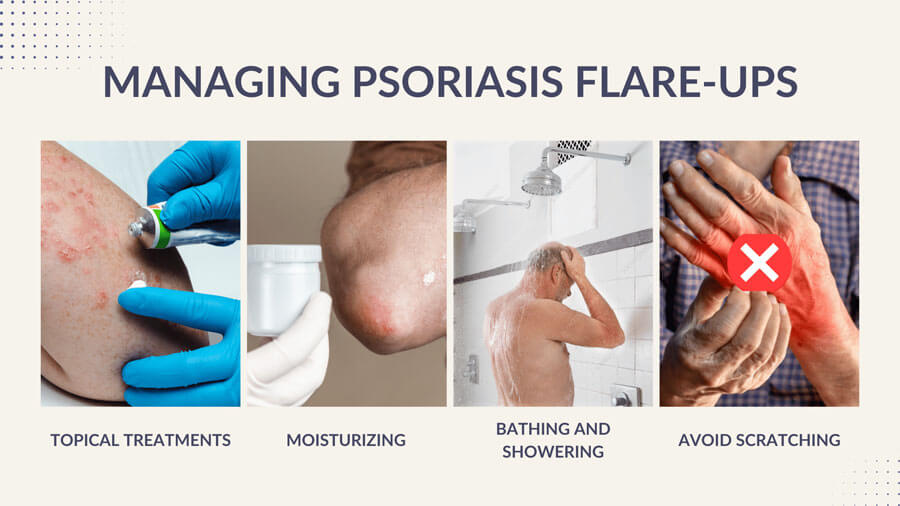
Effective management of flare-ups involves several approaches:
Topical Treatments
Use prescribed ointments to relieve symptoms. Follow your doctor’s instructions to avoid overuse and potential side effects.
Moisturizing
Keep your skin hydrated with lotions designed for psoriatic skin. Thicker, emollient-rich creams can offer longer-lasting hydration, especially if applied in the morning and evening.
Bathing and Showering
- Warm water: Use warm, not hot, water and keep showers short.
- Gentle cleansers: Choose hypoallergenic, fragrance-free cleansers to avoid drying out your skin.
- Moisturize post-bath: Apply moisturizer immediately after bathing to lock in moisture.
Avoid Scratching
- Hydrate: Keep skin well-moisturized to reduce itching.
- Cold compresses: Use them to relieve itching without scratching.
- Distraction: Engage in activities that take your mind off the urge to scratch.
- Soft fabrics: Wear breathable, soft fabrics and keep nails short to minimize damage from accidental scratching.
Healthy Lifestyle Choices

Regular exercise, like walking, swimming, or yoga, can reduce stress and improve overall health. A balanced diet rich in anti-inflammatory foods such as fruits, vegetables, lean proteins, and whole grains can support skin health. Foods high in omega-3 fatty acids, like salmon and flaxseeds, can also help reduce inflammation.
How Always Best Care Can Help

At Always Best Care, we understand the unique challenges that seniors face in managing psoriasis. Our compassionate caregivers provide personalized support to help you maintain your health and well-being. Whether you need assistance with daily skincare routines, medication management, or emotional support, we’re here to help. Partnering with an in-home care provider can help you manage your psoriasis more effectively. A caregiver can assist you in avoiding triggers, taking good care of your skin, and following your physician’s orders. They can also help with various tasks during flare-ups when you might not feel your best. Contact Always Best Care of Shalimar at (850) 662-6530 to learn more and schedule your free consultation.





